Areva's future pegged to new plants in China
Updated: 2015-03-31 08:21
By Lyu Chang(China Daily USA)
|
|||||||||
French nuclear giant Areva SA is setting its sights on China's nuclear market, as the country, with the world's largest number of reactors under construction, embarks on a major expansion program.
The French firm was hit hard by the global downturn in demand for nuclear energy after the Fukushima nuclear plant crisis in Japan in 2011.
According to its latest annual financial statement, Areva lost around 5 billion euros ($5.3 billion) in 2014, compared with a 500 million euro loss the year earlier because of resultant delays in projects around the world, including most recently a landmark reactor planned in Finland.
However, Remy Autebert, its senior executive vice-president for the Asia-Pacific region, told China Daily that China will play an important role in the company's global strategy as a source for future growth.
It is reinforcing its partnership in the country with EDF Group, the French utility firm, said Autebert.
"We also have been fostering strategic alliances with Chinese companies to increase our industrial footprint and diversify our activities worldwide," Autebert said.
He said Asia accounts for just 15 percent of its total revenue, with the biggest growth in China.
"We plan to increase the Asian share to 20 percent and even 30 percent in the long term," he said.
The Paris-based company has launched a restructuring program designed to bring its debts under control with a target to save 1 billion euros each year by the end of 2017 by improving its supply chain, reducing global investment and making production more efficient.
Autebert said the company's global expansion plan makes sense especially as relatively few new nuclear plants are being planned to replace older ones that are being phased out in the West.
"The major part of the growth in China is new nuclear reactors," Autebert said. "It has the largest number of nuclear reactors under construction, and that will continue for some time."
Amid mounting pressure caused by air pollution, the Chinese government is accelerating the approval of new nuclear projects, adding six to eight reactors every year. China has 20 reactors in use and another 28 under construction, according to official data.
Areva has a long-standing partnership with major players in China, including a joint venture named CNNC Areva Shanghai Tubing, created in 2011 in cooperation with the China National Nuclear Corp.
CAST is operational with an annual production of 1,500 kilometers of zirconium tubes that can be used for nuclear fuel assembly in light water reactors. The company is also discussing a second JV to produce ingots, a raw material used for the tubes.
Autebert said Areva is supplying instrument and control systems for the fifth and sixth pressurized water reactors being installed at the Fuqing nuclear power plant in Fujian province in East China, without disclosing how much the deals are worth.
"It will mostly serve the Chinese market in the beginning, but it's possible we could expand to supply the global market in future," he said.
China's nuclear energy development plans got a fresh impetus earlier this month after the State Council gave the green light for new reactors at the Hongyan River nuclear power plant in northeastern Liaoning province.
Units 5 and 6 of the Hongyan plant got construction approval just before the Chinese Lunar New Year and following those, units 5 and 6 of the Fuqing nuclear power plant are the next possible candidates for approval, said industry experts.
Areva, which has been working with China General Nuclear Corp for 30 years, is also working on two evolutionary power reactors for China Guangdong Nuclear Power Company's Taishan nuclear power plant.
The EPR is a third-generation pressurized water reactor originally designed and developed by Framatome (now Areva), and Electricite de France in France, and Siemens AG in Germany.
Autebert said the company is now "preparing the Guangdong plant's commissioning phase, as all the components are in place".
Compared with the second-generation nuclear technology, EPR has more safety protection measures in place.
lvchang@chinadaily.com.cn
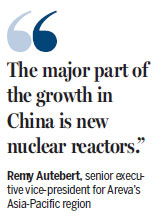
(China Daily USA 03/31/2015 page15)
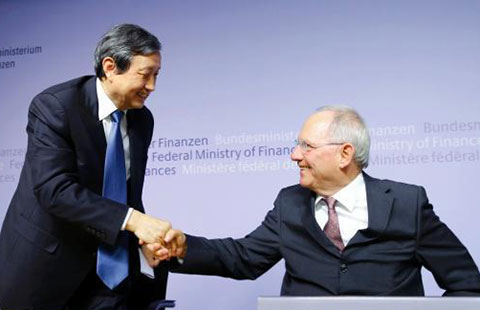
 10 European countries applying to join AIIB
10 European countries applying to join AIIB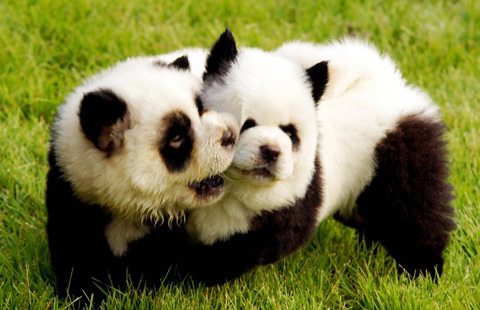
 Things are not always what they seem on April Fool's Day
Things are not always what they seem on April Fool's Day
 Welcome cherry blossom season in Tokyo
Welcome cherry blossom season in Tokyo
 Students show support for Earth Hour
Students show support for Earth Hour
 Sleep with fish at Tianjin aquarium
Sleep with fish at Tianjin aquarium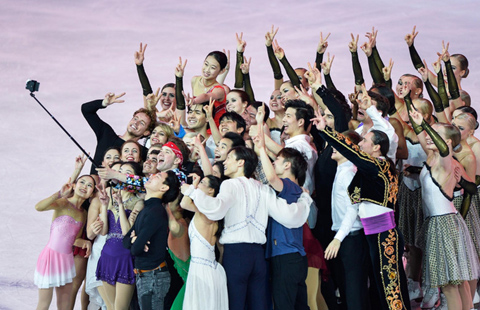
 Moments of beauty and strength at ISU figure skating worlds
Moments of beauty and strength at ISU figure skating worlds
 Pier Antique Show in New York
Pier Antique Show in New York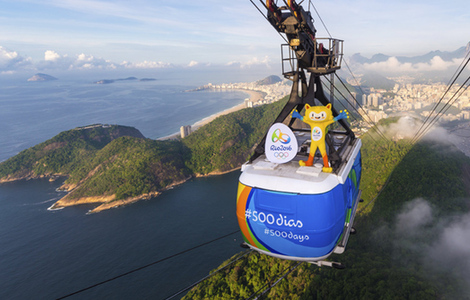
 Rio bay won't be clean for sailing: organizers
Rio bay won't be clean for sailing: organizers
Most Viewed
Editor's Picks

|

|

|

|

|

|
Today's Top News
Washington 'willing to work with AIIB'
One dead, two hurt as vehicle tries to ram US spy agency gates
Yili Group milks world of industry experience
China's GDP growth likely to rise to 7.2% in Q2
Chinese woman charged with fraud remains in jail
Focus shifts to cause of NYC explosion after 2 bodies found
Warship arrives to evacuate Chinese nationals from Yemen
China, US 'cannot afford' maritime dispute
US Weekly

|

|







